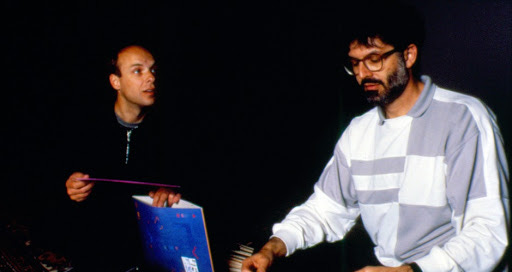Robin Sloan (RS) is an author, olive oil maker, and internet tinkerer. I could point to any number of amazing pieces he’s written around the internet, but there are two that stick out most for their effect on me personally: Stock and flow from his Snarkmarket days laid out a simple framework for thinking about the different types of content on the web and Writing with the machine encouraged me to spend some time playing with neural networks. Thanks Robin! - Noah (NRB)
Robin here. I loved Noah's WITI on scenius; it's an idea I believe in, one that's been important to me. Reading about it, and Brian Eno, reminded me of a media artifact I discovered a couple of years ago—one I still think about often.
Back in 2019, I was mailing out a lot of zines, each in a batch of about 2,000. This required that I apply a wafer seal and a shipping label to each one; it took basically an entire day, peeling & sticking, peeling & sticking.
Preparing one of the zines on a rainy morning in my little media lab (it's in the neighborhood described in this WITI) I decided to listen to an old radio program I'd bookmarked at some point. It was an interview in 1980 of Brian Eno by radio host Charles Amirkhanian for his show Ode to Gravity on the Berkeley station KPFA, now preserved on the Internet Archive.
The interview ran for about two hours, and I loved it, but there were still more labels to stick—a LOT more—so I went scrounging for related material.
Clicking around in the Internet Archive, I found a recording of KPFA's broadcast event in 1988 called "Brian Eno Day": a tour of Eno's catalog at that time, playbacks of old appearances (including the one from 1980), fresh interviews for the occasion—Eno was there in the studio, live, all day—and calls from Bay Area listeners.
It was twelve hours of audio!
Why is this interesting?
I didn't listen to the whole twelve hours, of course, but I did play several of the archived blocks all the way through, and something about the liveness of the broadcast, the looseness and practicality of it—complete with pleas to donate!—was totally transporting. My main workspace is windowless, except for a skylight; it was a rainy day; I was applying shipping labels to paper zines: there was nothing in my little bubble of experience to insist I *wasn't* actually in the year 1988.
It honestly felt like I had traveled back in time. The fact that Eno and the KPFA hosts and all the callers were referencing cities and streets just a few miles away from where I was sitting was part of it, of course; I'm not sure I would have had the same impression if I'd been listening in Detroit.
The callers were exemplars of eternal Bay Area types: cerebral, mystical, pretentious, self-regarding, a bit "too much" all around… and, as an aside, they really did speak a little differently back in 1988: listening across the decades helped me hear it.
Their voices were ghostly in my little lab.
The final hour of the program, in which everyone behind the microphones was palpably tired and overheated and loopy, with the callers playing along, disintegrating into silliness, was for me the highlight—just totally entertaining and alive.
Finally, Eno declares that, for the remainder of the broadcast, all of his statements will be lies.
This odd recording was one of the most memorable things I've ever listened to, mostly because it was such a surprise. Three cheers for Ode to Gravity, KPFA, the Internet Archive, and rainy days.
Idea of the Day:
Hadn’t run into the idea of Lizardman’s Constant before yesterday. It’s great. (NRB)

Quick Links:
Inside an abandoned airport terminal where everything still works (CJN)
Dead startup toys (CJN)
Best US airlines of 2021 (CJN)
Thanks for reading,
Noah (NRB) & Colin (CJN) & Robin (RS)
—
Why is this interesting? is a daily email from Noah Brier & Colin Nagy (and friends!) about interesting things. If you’ve enjoyed this edition, please consider forwarding it to a friend. If you’re reading it for the first time, consider subscribing (it’s free!).



